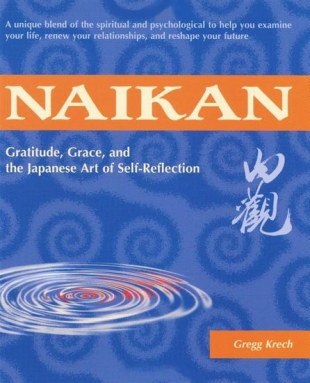Gregg Krech is Director of the ToDo Institute, an education and retreat center near Middlebury, Vermont. He is a practitioner of a method of self-reflection, attention, gratitude, connections, kindness, and compassion developed in Japan during the 1940s by Ishin Yoshimoto, a devout Buddhist of the Pure Land sect. David K. Reynolds introduced Naikan to the United States in the 1970s. Programs and retreats in this Japanese practice have been offered regularly by the ToDo Institute since 1989.
The Japanese word Naikan means "looking inside" but as Krech points out, it can be understood more poetically as "seeing oneself with the mind's eye." This practice of self-reflection is based on three questions: What did I receive? What did I give? What troubles and difficulties did I cause? With great elan and creativity, using essays, fables, quotations, and individuals' reports on their efforts, Krech shows how Naikan can enrich our lives and bring us a deeper and more reverent appreciation of the world around us.
"We hurry through our day giving little attention to all the 'little' things we are receiving. But are these things really little?" Krech writes early on. "They only seem so because, while we are being supported, our attention is elsewhere. But when there is no hot water for a shower or we lose our glasses, these little things grab our attention." When we consciously pay attention to what we have received from others, the realization dawns on us how dependent we are on others. In one two-page exercise of self-reflection, Krech delineates all the people, things and places involved in the delivery of a pizza to his house.
When our days begin to shine with gratitude, it becomes much easier and more natural for us to give to others in acts of kindness, generosity, and compassion. Krech cites individuals who have practiced giving to their loved ones, such as the husband who gives his wife a rose when she picks him up at the train station. Or a person who is giving to a cherished object in her home by looking after it with love.
Sadly, it is more likely that we will spend much of our time judging, criticizing, or making negative comments on the infinite variety of ways other people cause us inconvenience or problems. In the Naikan practice of reflecting upon the troubles and difficulties we have caused, the burden shifts to our deeds. Here Krech shares the spiritual practice of Benjamin Franklin who did a daily assessment of his enactment of 13 essential virtues.
Naikan: Gratitude, Grace, and the Japanese Art of Self-Reflection is an invaluable resource for anyone who practices everyday spirituality. The author presents plenty of concrete exercises that will spur your soul to attention, kindness, compassion, and, most of all, gratitude. Krech is especially cogent in his emphasis upon the connections that give life meaning and the importance of including inanimate objects in the orbit of our care and genuine love.
